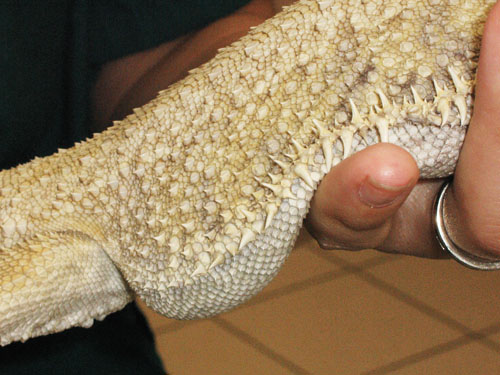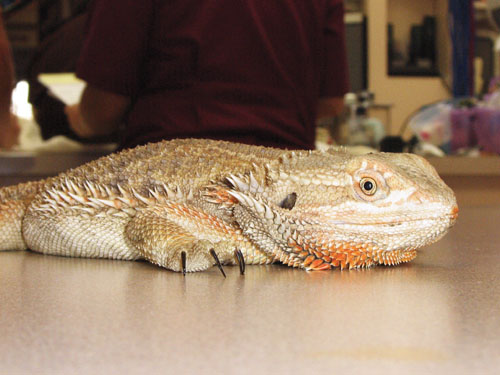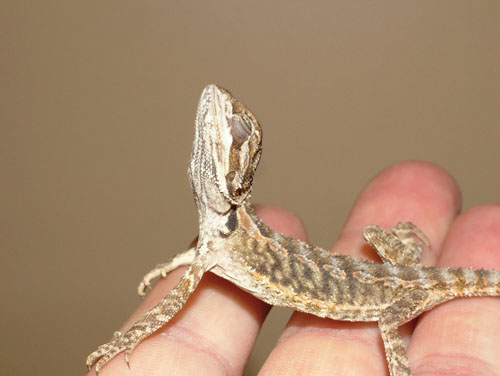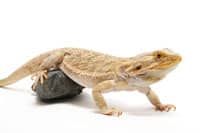Also known as wasting disease and stargazing disease, this bearded dragon disease can be fatal to your beardie.
Atadenovirus is a contagious disease that can cause serious illness in bearded dragons. Older literature refers to it as adenovirus. It may also be known as "wasting disease" and "stargazing" disease, among other terms. Unfortunately, this virus is very common in bearded dragon (Pogona vitticeps) collections and can be fatal.
What to Look For
Atadenovirus-infected (ADV-positive) baby bearded dragons are often underweight and in poor health, and they may not live more than 90 days. They may not grow as fast as healthy dragons, lose weight, spend a lot of time hiding and die without any other signs. In some cases, the infected baby will die from hepatitis, an infection of the liver.
ADV-positive dragons are more likely to be seriously ill from intestinal parasites, such as coccidian, flagellated protozoa, amoebas and nematodes. Others go on to develop bacterial infections of their intestine or liver. Those that make it past the 90-day mark often have trouble fighting other infections throughout their adult lives.
Some ADV-positive dragons end up with damaged livers and intestines, are always on the thin side and sleep a lot more than a virus-free dragon. In some ADV-positive dragons, the virus spreads to the brain and spinal column, and causes a twitching of the toes and tail tip, arching of the head and tail (sometimes known as stargazing), seizures, uncontrolled rolling in the enclosure and death. Dragons that become infected as adults may suddenly die from neurological problems, but more often, they go on to develop liver disease and other health problems. Some baby and adult dragons appear to be resistant to infection, and some ADV-positive dragons may appear healthy but are carriers and shed the virus throughout their lives.
How Atadenovirus Spreads
Atadenovirus spreads easily from dragon to dragon by direct contact as well as from contaminated hands and tools, which is why it can spread so fast in a breeding colony or among baby dragons on tables at swap meets. Some dragons may become infected when uneaten insects or other food items have been recycled and moved from one infected cage to another.
It's important to understand that there are seemingly healthy bearded dragons that carry the atadenovirus, and they can spread it to uninfected dragons. If a male is a carrier, he can infect the females put in with him for breeding. If one of those infected females is placed with an uninfected male the next year, that male gets infected and can pass on the virus to other females, and so on. The virus is not spread by sexual contact alone, it can be passed just from sharing the same cage, which is why it spreads so quickly in baby dragons, leading to epidemics of unthriftiness and unexpected death. Atadenovirus may be passed from mothers to babies, and just a single ADV-positive baby can readily infect all of the other babies in the incubator or the baby cages.

Photo credit: Kevin Wright, DVM
Fluid-filled coelom (body cavity) due to liver impairment caused by atadenovirus infection.
Keep Your Reptile Enclosures Clean
Given that dragons may become infected from dirty tools and recycled food, you need to practice proper cleaning and disinfection with your collection. First, never recycle food of any sort. If your dragon didn't eat it, throw it out. Not only does this prevent the spread of atadenovirus, it prevents the spread of other contagious diseases like coccidia. Clean dirty tools in warm, soapy water and soak them for 15 minutes in a disinfectant such as diluted household bleach (1 cup to 1 gallon of water. Rinse off the disinfectant with fresh water. Make sure the clean tools are stored away from the cages so that they do not get accidentally infected. Ideally, you should have different tools for each cage of dragons.
It is quite easy to end up with an infected colony if all of the adults are not carefully screened and managed to be sure they are ADV negative.
Practice safe dragon handling at swap meets. Use a waterless hand sanitizer when you move from one vendor to another, and even when you handle babies from different containers at the same table. Better yet, only handle dragons when you are in the final stage of making a purchase, don't ask to pick one up unless you are assessing it to be sure it is in good enough condition for you to buy it. Don't be offended if a vendor asks you to use the sanitizer at the table before handling his or her dragons – even if you sanitized your hands somewhere else, it shows that you understand the importance of proper hygiene around animals.
Diagnoses and Treatment of Atadenovirus
If you have an ill bearded dragon, young or old, a veterinarian can examine it and perform tests to better understand what is wrong. In some instances, baby bearded dragons may have a parasite that may cause loss of appetite, diarrhea, and weight loss or slow growth. If the baby is ADV negative and the protozoan parasite coccidia is diagnosed, your veterinarian may prescribe ponazuril as a safe and effective treatment. If the baby is ADV positive, the medication will still target the coccidian, but your dragon may not develop the immunity needed to fight this parasite and may be predisposed to coccidiosis the rest of its life. The same is true for other parasites, such as flagellated protozoa, as well as many other infectious diseases.
Your veterinarian's treatment plan will depend on what else may be wrong with your bearded dragon. A fecal parasite exam and bloodwork to assess the white blood cell numbers, detect anemia, and rule out changes in liver and kidney function may be done at the veterinary hospital. Tests to detect atadenovirus and other diseases have to be sent to an outside lab, such as the laboratory of Dr. Jim Wellehan, a leading researcher in reptile infectious diseases based at the University of Florida Veterinary Medical Teaching Hospital. Your veterinarian's recommendations are only as good as the diagnostic tests you allow to help him or her assess your dragon. If you decide to skip certain tests, your veterinarian will have more uncertainty about what is best for your dragon.

Photo credit: Kevin Wright, DVM
This ADV-positive bearded dragon is too weak to support itself while standing up.
Unfortunately, there is no known drug that eliminates atadenovirus. An ill, ADV-positive bearded dragon needs to stay warm, have ultraviolet-B light and be kept by itself, so that it doesn't have to compete with healthy dragons for food and basking space. If it is dehydrated, your veterinarian may prescribe fluids to be given by injection, or simply a daily soak in shallow, lukewarm water or even drinking water placed into the mouth by a syringe. If it is losing weight, assist-feeding with crushed insects placed into the mouth may help. Highly digestible liquid diets and extra vitamins and calcium may be needed if the intestine has been damaged by infection to the point that the dragon is not able to absorb sufficient nutrition from its food. If a bacterial or fungal infection is detected, the veterinarian may prescribe antibiotics or antifungal medications. If the liver is not working properly, milk thistle and other nutriceuticals may be suggested.

Photo credit: Kevin Wright, DVM
Star-gazing in a baby bearded dragon infected with the atadenovirus.
Unfortunately, many baby dragons that are younger than 90 days old when they get infected with atadenovirus will die or become so sick that they need to be euthanized. Some infected dragons live normal lives and do not need much in the way of medical care. They are fine as pets but should be kept away from other dragons, other than those known to be ADV positive, too. Other dragons may have flare-ups and lose their appetite, sleep a lot, have diarrhea or constipation, and may even develop swellings of the belly or beneath the chin. Some dragons develop more serious signs later in life, from the virus spreading to the nervous system. There is no way to predict which dragons can do well with atadenovirus infection and which ones are going to have long-term health problems.
Atadenovirus Prevention
Every dragon that has atadenovirus should be considered a threat to other dragons that are free of the infection. It is important to keep the ADV-positive dragons away from healthy dragons. If you want to adopt or keep an ADV-positive dragon, you are responsible for keeping it away from other dragons, so it doesn't spread the disease and make other pets ill. You must be willing to seek veterinary help if it develops health problems. You need to be willing to euthanize your dragon when it is suffering despite medical care and it is no longer humane to keep it alive.
It is possible to manage breeding colonies so that the adults are free of atadenovirus and produce healthy uninfected babies. The first step is to test your bearded dragons and determine their status. An experienced veterinarian can collect samples to submit for laboratory testing. It may take seven to 14 days for test results. In the meantime, work out a plan for what steps you will take after the test.
If any of your dragons die, have a complete necropsy performed by an experienced reptile veterinarian. This will help you know if the death was due to a serious, contagious disease like atadenovirus; if it was something else that needs to be changed, such as the diet; or if it was some other unavoidable cause of death, such as aging.
Be very careful about how you manage your colony. Test all incoming dragons for atadenovirus and keep them isolated in a separate room from your uninfected dragons until the test results are reported. Service the new dragons last, after you are done working with your breeding group, and do not go back to handle any of your uninfected dragons after caring for those in quarantine.
If the new dragons have negative test results, it is not 100-percent certain that they are truly free of this disease. Continue to quarantine them for a total of 60 days and consider retesting them after the first 30 days, just to make sure that they are truly uninfected. If you notice any that are not doing well, retest them. If any are ADV positive on the first or second screening, they all should be considered contaminated and should not be brought into your ADV-free breeding colony. If there is one that you absolutely must keep that tested negative but was exposed to ADV-positive dragons, you may keep it isolated for six months and test it at 90 days and 120 days. That means no other dragons come into quarantine until it has completed this six-month process. If it tests negative both times during this six-month quarantine, then you may consider adding it to your breeding colony. However, there is still a very slight risk that this could introduce atadenovirus into your colony, so ask yourself again if this new breeder is really worth the risk.
If you're thinking about buying your first bearded dragon as a pet, be aware that many breeders do not test their dragons, so it can be difficult to find "clean" babies. Be prepared to pay more for babies from a clean colony backed up by testing through a reputable veterinarian and laboratory. Get your dragon tested for atadenovirus within the first week of bringing it home. If you discover that your dragon is infected, talk to your veterinarian and develop a lifelong preventive medicine plan.
If you already have bearded dragons, particularly if you are breeding them or planning to breed them, work with your local veterinarian to have them tested. If you have a large collection, you can group together swabs from all the dragons in a single cage rather than individually test them, and then any cages that are negative can be separated from the ADV-positive cages and retested later. What you do with ADV-positive dragons is a concern. I believe they can make good pets, but that the owners should be informed their new pets are ADV positive and what that means.
I recognize that it will be difficult to eliminate atadenovirus from bearded dragons. Some breeders believe that they are breeding resistance to the virus. Viral researchers suggest otherwise, citing cases where viruses adapt quickly to any improvements in animals' immune systems. The co-evolution of a virus and its host may result in a benign virus that causes minimal illness, or it may create more harmful strains, whichever best ensures that the virus survives and multiplies. Right now, atadenovirus is somewhere in the middle, causing serious illness in many dragons. Whether it is still in captive bearded dragon colonies 20 years from now will depend on what consumers demand and what breeders provide.
Support Research
Atadenovirus is just one viral disease in captive-bred reptiles. Kingsnakes (Lampropeltis ssp.) develop anorexia and diarrhea due to an infection of the intestine from a virus closely related to the bearded dragon atadenovirus. Paramyxovirus causes illness and death in a number of snakes, most notably rattlesnakes and vipers.
If we are going to have healthy herp pets long into the future, we need to model the work done with domestic dogs and cats, which has helped reduce the threat of their important viral diseases, such as canine distemper, canine parvovirus, feline leukemia and rabies. I encourage hobbyist groups to donate funds to support research into the infectious diseases of reptiles, such as the work done by Dr. Jim Wellehan
The author thanks Dr. Jim Wellehan for taking the time to be interviewed in the preparation of this article.
Kevin Wright, DVM, is a Diplomate of the American Board of Veterinary Practitioners (Specialist in Reptiles and Amphibians) and works at the Arizona Exotic Animal Hospital, in Mesa, Ariz. The hospital website, www.azeah.com, includes more than 150 free articles on exotic pets. Dr. Wright and Dr. Johnson treat a wide variety of exotic pets.


